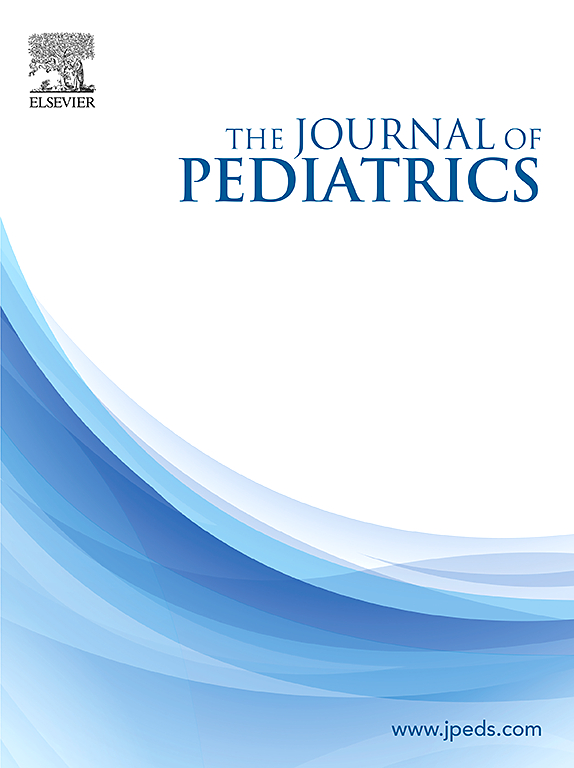Long-Term Symptoms in Periodic Fever, Aphthous Stomatitis, Pharyngitis, and Cervical Adenitis Syndrome after Tonsillectomy
IF 3.5
2区 医学
Q1 PEDIATRICS
引用次数: 0
Abstract
Objective
To investigate the initial and long-term clinical course of periodic fever, aphthous stomatitis, pharyngitis, and cervical adenitis (PFAPA) syndrome after tonsillectomy regarding fever episodes and nonfebrile PFAPA-related symptoms.
Study design
An observational cohort study with retrospective and cross-sectional data based on 86 of 101 patients who underwent tonsillectomy for PFAPA between January 2006 and March 2020 from a cohort of 336 patients diagnosed with PFAPA as children. Data were collected by structured telephone interviews and review of medical records. Parents were interviewed regarding initial response to tonsillectomy and the clinical course following tonsillectomy. Patients, if ≥18 years old, or parents, if patients were younger, were interviewed regarding symptoms present at the time of this long-term follow-up study.
Results
Six months after tonsillectomy, 45 of 86 participants (54%) had no symptoms of PFAPA, 19 (22%) had only nonfebrile PFAPA-related symptoms, 17 (20%) had ongoing but fewer or milder fever episodes, 1 (1%) had ongoing febrile episodes without improvement, and 4 (5%) had missing data because parents were unavailable. In 10 of 45 patients with initial remission, fever episodes reappeared 0.5-4.5 years after tonsillectomy. At long-term follow-up (median 8.8 years [range 2.8-16.1 years] after tonsillectomy), 54 of 86 (63%) had no symptoms of PFAPA, 15 (17%) had febrile episodes, generally with longer intervals between flares than before tonsillectomy, and 17 (20%) had nonfebrile PFAPA-related symptoms.
Conclusions
While PFAPA symptoms resolve or are milder post-tonsillectomy among most of the patients, the long-term outcomes showing residual symptoms among a substantial minority should be considered when evaluating tonsillectomy as a treatment option for PFAPA. Increased awareness of persistent symptoms after tonsillectomy may improve understanding and health care for these patients.
扁桃体切除术后周期性发热、口疮性口炎、咽炎和宫颈腺炎综合征的长期症状。
目的:探讨扁桃体切除术后周期性发热、口疮性口炎、咽炎和宫颈腺炎(PFAPA)综合征的初期和长期临床过程中发热发作和非发热的PFAPA相关症状。研究设计:一项观察性队列研究,回顾性和横断面数据基于2006年1月至2020年3月期间接受PFAPA扁桃体切除术的101例患者中的86例,这些患者来自336名诊断为儿童PFAPA的患者。通过结构化电话访谈和查阅医疗记录收集数据。对父母进行访谈,了解扁桃体切除术后的初步反应和扁桃体切除术后的临床过程。如果患者年龄≥18岁,或者如果患者年龄更小,则对其父母进行访谈,以了解在这项长期随访研究时出现的症状。结果:扁桃体切除术后6个月,86名参与者中有45名(54%)没有PFAPA症状,19名(22%)只有非发热的PFAPA相关症状,17名(20%)有持续但较少或较轻的发热发作,1名(1%)有持续的发热发作但没有改善,4名(5%)由于父母不在而缺少数据。在45例最初缓解的患者中,有10例在扁桃体切除术后0.5-4.5年再次出现发热。在长期随访中(扁桃体切除术后中位8.8年[范围2.8-16.1年]),86例患者中有54例(63%)无PFAPA症状,15例(17%)有发热发作,发作间隔通常比扁桃体切除术前更长,17例(20%)有无发热的PFAPA相关症状。结论:虽然在大多数患者中,扁桃体切除术后PFAPA症状缓解或减轻,但在评估扁桃体切除术作为PFAPA的治疗选择时,应考虑在相当少数患者中显示残留症状的长期结果。提高对扁桃体切除术后持续症状的认识可以提高对这些患者的理解和保健。
本文章由计算机程序翻译,如有差异,请以英文原文为准。
求助全文
约1分钟内获得全文
求助全文
来源期刊

Journal of Pediatrics
医学-小儿科
CiteScore
6.00
自引率
2.00%
发文量
696
审稿时长
31 days
期刊介绍:
The Journal of Pediatrics is an international peer-reviewed journal that advances pediatric research and serves as a practical guide for pediatricians who manage health and diagnose and treat disorders in infants, children, and adolescents. The Journal publishes original work based on standards of excellence and expert review. The Journal seeks to publish high quality original articles that are immediately applicable to practice (basic science, translational research, evidence-based medicine), brief clinical and laboratory case reports, medical progress, expert commentary, grand rounds, insightful editorials, “classic” physical examinations, and novel insights into clinical and academic pediatric medicine related to every aspect of child health. Published monthly since 1932, The Journal of Pediatrics continues to promote the latest developments in pediatric medicine, child health, policy, and advocacy.
Topics covered in The Journal of Pediatrics include, but are not limited to:
General Pediatrics
Pediatric Subspecialties
Adolescent Medicine
Allergy and Immunology
Cardiology
Critical Care Medicine
Developmental-Behavioral Medicine
Endocrinology
Gastroenterology
Hematology-Oncology
Infectious Diseases
Neonatal-Perinatal Medicine
Nephrology
Neurology
Emergency Medicine
Pulmonology
Rheumatology
Genetics
Ethics
Health Service Research
Pediatric Hospitalist Medicine.
 求助内容:
求助内容: 应助结果提醒方式:
应助结果提醒方式:


